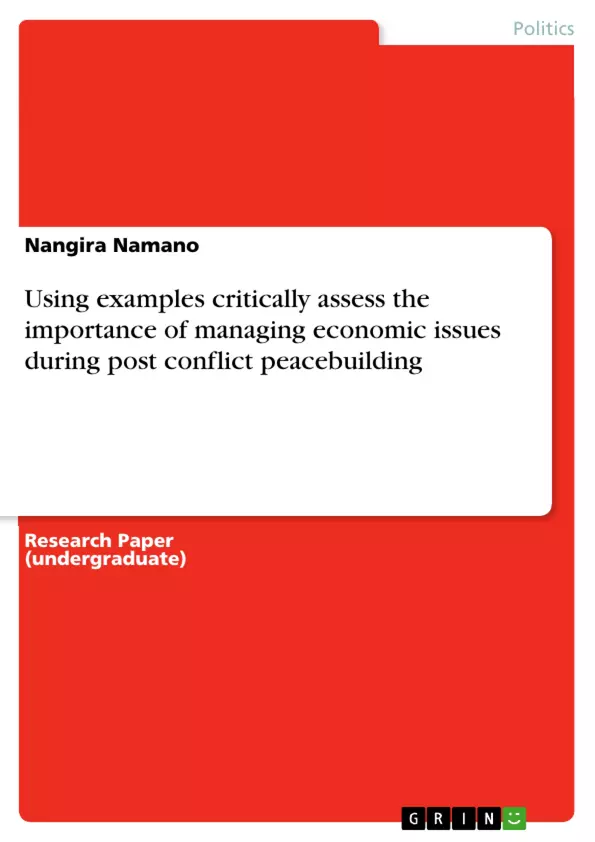This paper seeks to critically look at how post-conflict stricken countries tend to have different options for the international community, regional, state corporations and the private sector to have the economic reconstructed. Thus, once a conflict in question is resolved, some groups tend to either directly or indirectly oppose the outcomes of the peace agreements or unilateral win by one of the adversarial groups. By giving examples on how the UN, IMF, World Bank has assisted not only in ensuring that peace exists but also at the forefront in rebuilding the capacities of the weakened populations to enhance the infrastructure and subsequently come up with ways to ensure a sustained economy.
Inhaltsverzeichnis (Table of Contents)
- Abstract
- Economic issues
- Financial regulations
- Monetary policy
- Debt relief
- Private sector creation
- Transparency in Employment
- Access to public state service
- Free market or free trade
- Most favored nation (MFN) status
- Tax collection
- Reparation
- Women's issue
- References
- Footnotes
Zielsetzung und Themenschwerpunkte (Objectives and Key Themes)
This paper aims to critically examine the crucial role of economic management in post-conflict peacebuilding. It analyzes how international organizations, regional bodies, state corporations, and the private sector contribute to economic reconstruction in conflict-affected countries. The paper explores the challenges posed by various actors who may oppose peace agreements or seek to exploit the situation for personal gain.
- The importance of economic reconstruction in post-conflict settings
- The role of international organizations in supporting economic recovery
- The impact of corruption and illegal markets on peacebuilding efforts
- The challenges of establishing and maintaining financial stability in post-conflict states
- The importance of addressing economic issues such as debt relief, private sector development, and revenue generation
Zusammenfassung der Kapitel (Chapter Summaries)
The paper begins by outlining the key aspects of economic reconstruction, highlighting the interconnectedness of physical rebuilding, structural transformation, and economic development. It explores the significance of economic advantages in fueling conflicts, emphasizing the role of rebel groups in exploiting natural resources to finance their objectives. The paper examines the complexities of illicit markets, such as human trafficking and the trade of illegal commodities, and their impact on conflict dynamics.
The paper then delves into the importance of financial regulations in post-conflict peacebuilding, emphasizing the need for stabilizing financial systems, controlling revenue and spending, and establishing robust financial institutions. It highlights the critical role of monetary policy in managing inflation and unemployment, advocating for the creation of an independent central bank free from political influence.
Schlüsselwörter (Keywords)
The key themes and concepts explored in the paper include economic reconstruction, fiscal policy, infrastructure, monetary policy, post-conflict, privatization, reintegration, reparation, and structural transformation.
Frequently Asked Questions
Why is economic reconstruction vital for peacebuilding?
Economic stability helps rebuild infrastructure, provides livelihoods for weakened populations, and prevents the resurgence of conflict fueled by economic despair.
What role do the IMF and World Bank play in post-conflict zones?
These organizations assist in rebuilding financial capacities, managing debt relief, and establishing monetary policies to ensure a sustained economy.
How does corruption affect the peacebuilding process?
Corruption and illicit markets (like human trafficking) can undermine peace agreements as adversarial groups may exploit weakened state structures for personal gain.
Why is an independent central bank important in post-conflict states?
An independent central bank is crucial for managing inflation and unemployment without being influenced by volatile political interests.
What is the significance of the private sector in reconstruction?
Creating a robust private sector encourages free trade, tax collection, and transparency in employment, which are essential for long-term economic growth.
- Quote paper
- BSc. BIT MA (ICM) Nangira Namano (Author), 2017, Using examples critically assess the importance of managing economic issues during post conflict peacebuilding, Munich, GRIN Verlag, https://www.grin.com/document/371933



